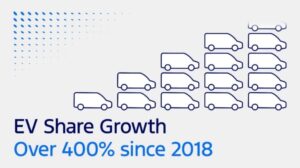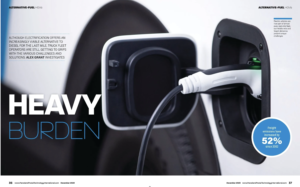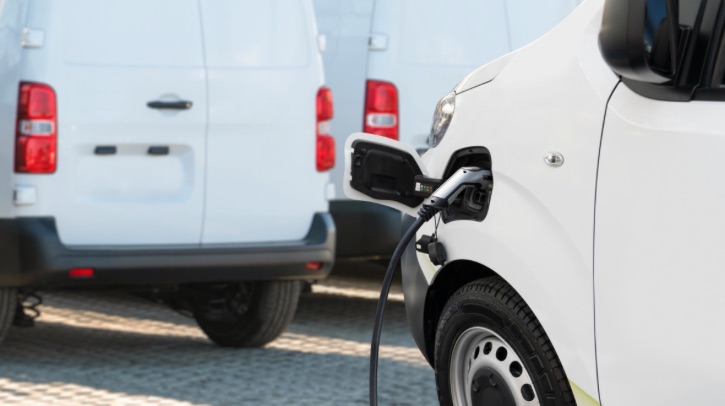The Centre for Economics and Business Research (CEBR) has released a study, The Economics of Commercial Van Usage Across Europe 2024, which reveals that van-related businesses contributed around €1tn (US$1tn) across the EU and UK in 2023 – an increase of 6.5% since 2021 and 27.4% since 2017. On this basis, if van-powered businesses were an EU member state, they would be the sixth largest by GDP. In the EU, an estimated €14.1bn (US$15.3bn), or 1.6%, of that activity, was supported by electric vans.
Ford Pro commissioned the report to better understand the broader European commercial van landscape, comprising 23 million SMEs, including owner-operators, which account for 99% of businesses in Europe.
According to the report, the recognition of electrification’s business value by small and medium enterprises (SMEs) has the potential to accelerate EV adoption and significantly benefit business productivity and the European economy. However, it also found that charging remains a concern.
Initially, commercial electric vehicle adoption was believed to be led by larger businesses with fleet managers and corporate sustainability goals. Now, SMEs are increasingly adopting EVs as they recognize the significant business benefits. A survey of more than 1,000 commercial van drivers found that these businesses are already realizing significant energy cost savings as well as improving their productivity and operations with supporting technology. Even non-EV adopters are looking at switching within five years, although charging remains a concern.
“We have been helping small businesses to build the economies of Europe for almost 60 years – but the greatest opportunity to improve their uptime and productivity lies ahead,” said Hans Schep, general manager of Ford Pro Europe.
“Florists, plumbers, and bakers will play a leading role in taking EV adoption to the next level, and we will bring large fleet levels of charging, software and servicing support to these small businesses so they can electrify in the way that best makes sense for them.”
Electric vans on the charge

The Economics of Commercial Van Usage Across Europe 2024 report revisits what the researchers state to be a dramatically changed landscape since a previous report was published in 2019. The 2024 report shows that despite the impact of the Covid-19 pandemic, the cost-of-living crisis and war in the Ukraine, the impact of vans on the economy has increased dramatically.
The report includes an update to the Electrification Index, a measure of commercial EV adoption status and future potential for five prominent European van markets – France, Germany, Italy, Spain and the UK. Considering factors including electric van sales, charging points, incentives and the increase in low-emission zones, the index identifies that adoption and potential increased in most markets since the last calculation in 2018. This increase is partly supported by significant growth in electric van availability.
The CEBR study found that Germany had the highest EV proportion of new van registrations in 2023 at 9.5%. The UK showed the greatest growth in electric van sales since the last report in 2018, with its share increasing from 0.3% to 6%. France was identified as the market with the most electrification potential, just as it was in the 2018 report, reflecting its already strong adoption of electric vehicles and high-quality charging infrastructure. Overall, Spain showed the most improvement in its Electrification Index score.
Survey respondents said reduced operating costs were the top reason to switch to EVs (46.3%) supported by annual EV van charging costs of €3,700 (US$4,000) vs €12,400 (US$13,400) for a petrol or diesel van. Analysis of the total cost of operating electric vans compared to diesel or petrol equivalents found electric vehicles can make up for their higher initial purchase costs within a typical three-year ownership timeframe.
Beyond financial benefits, the survey also found SMEs are turning to EVs to access to low emissions zones. This was the joint most common reason to switch (46.3%), followed by concern for the environment (45%) and brand reputation (45%).
Remaining EV concerns
Charging time was the biggest concern for those who have not yet switched to EVs (38.1%) with upfront purchase costs also an issue (37.7%). Despite this, among those yet to switch, a majority (58.6%) said that they were at least somewhat likely to choose an electric van over the next five years.
Operators that have already switched to EVs are more likely to recognize the importance of technologies and services that complement van ownership. Among business adopters of technologies and software, the overwhelming majority reported positive productivity impacts. This was particularly the case for those adopting vehicle safety and security measures, fleet management solutions and communication software.
Similarly, an overwhelming majority of business software adopters reported positive operational impacts. This was particularly likely among adopters of compliance and reporting systems, telematics integrated with other systems, and communication software.
“The transition to electric could bring considerable societal benefits on both local and global scales, primarily through the mitigation of harmful pollutants and greenhouse gas emissions,” said Nina Skero, chief executive of CEBR.
“Our analysis also demonstrates that vans already support a significant proportion of economic activity across European markets. Indeed, van-reliant industries contributed €860bn [US$930bn] to European Union economies last year. The portion of this figure attributed to electric vans is expected to grow as adoption continues and more businesses realize and accrue EV operational savings.”
For more of the top insights into the future of electric vehicles in the logistics industry, read Parcel and Postal Technology International’s exclusive feature “Heavy burden”, here. 


